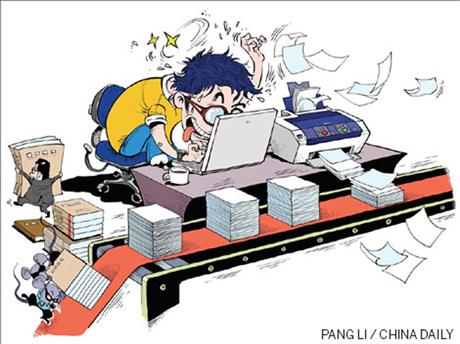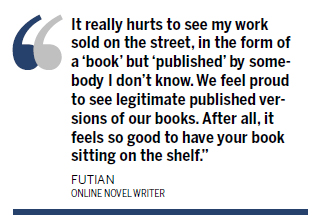Life and Leisure
Between the lines
By Liu Wei (China Daily)
Updated: 2010-09-01 11:49
 |
Large Medium Small |

Writing for the Web is fast emerging as an attractive option for both writers and publishers. But can online books ever shake off the feeling this is not serious literature? Liu Wei reports
Law student Wang Chen has more than 20 novels under her belt, all published online. It costs about 0.03 yuan to read 1,000 Chinese characters of her works on literature website www.17k.com - money that she shares with the website.The nation's writer wannabes are discovering that writing online offers the best way out of having to compete for space in literary magazines and lobbying publishers for that all-important chance.

Online literature is big business. According to Time magazine, Shanda Literature, which controls over 90 percent of China's online reading market, rakes in an estimated 100 million yuan ($15 million) every year.
A report released by China Internet Network Information Center shows the country's online readers stood at 162 million in 2009. The report calls online literature the fourth most-popular type of online entertainment after music, videos and games, with E-books emerging as an important new distribution channel.
The only thing, it seems, online writers have to worry about is garnering more clicks.
Yet, the pressures of fierce competition, controversy over their works' literary merit and rampant piracy are all taking their toll.
Wang says she started writing online just for fun. It is still something she does to occupy her spare time. She writes mostly on the supernatural and about ancient dynasties, two of today's popular genres.
According to Wang Xiaoquan, an editor with 17k.com, male readers invariably prefer fantasy, while female ones like romance.
But for both groups, the stories need to be original, suspenseful and well-paced, says Biluohuangquan, a senior editor with www.qidian.com, the nation's largest literature website.
"Most online novels are serialized," he says. "Without an original hook, readers will soon turn to other works - of which there are so many on the Internet."
While both Qidian and 17k do not insist on a daily output from the writers, the direct link between clicks and income leads many to push themselves.
"Of course, those who update their stories quickly tend to win more readers," Biluohuangquan says. "But the pressure comes mainly from the readers, not the website."
Some writers find online writing attractive enough to go with it full time.
Futian, 29, used to work as a translator when she started posting historical novels on Qidian in 2005.
Soon an editor found her and wanted to sign a contract with her. She accepted the offer proudly, saying, "only good ones get offered contracts".
By the very next year she was making 7,000 yuan a month, a decent amount in Shanghai for a 20-something.
She quit her job, writing at home and doing part-time translations occasionally.
Now she writes about 6,000 characters a day - an average output for online writers. Thanks to the loyal readers she has cultivated over the years, she now makes more than 10,000 yuan a month.
"The best part is you get to make money out of something you love," she says.
She works about eight hours a day, spending the rest doing part-time work and researching for her novels.
"In many companies working overtime does not guarantee more pay, but on the Internet more writing does mean more money," she says.
However, Futian admits that there are writers who lead a very exhausting life, staying up late to write more than 10,000 words a day, but she insists they are in the minority.
"Some do it to meet deadlines," she says. "And some just want to make more money, but in the long term it is quality that matters. If you write too much, you may lose your readers. "
Futian now has 16 books in print. Many online writers have their works published or adapted for TV or film.
He Wei, a senior editor with the Sichuan Literature and Art Publishing House, says one third of the books she edited last year were printed versions of online works, mainly on campus life and urban romance.
Some of these books have become smash hits and trend-setters in the publishing world, such as the tomb-theft stories of Tianxiabachang and the historical essays of Shi Yue.
However, disputes over whether works published online have any literary merit at all continue. Most criticisms are centered on the view that to grab eyeballs in the shortest possible time, online books focus on content more than technique and are rough works.
Ninety nine percent of online literature, says 46-year-old writer Mai Jia, is rubbish. At a seminar in April, he said if he had his way, he would get rid of it.
Veteran columnist and editor Han Haoyue disagrees.
"Online works employ a straightforward language, humor and imagination," he says. "They may lack profundity, but they are so close to and full of life."
Biluohuangquan believes the market is the best arbiter of the quality of these works.
"Let the market decide," he says. "Works of poor quality will die a natural death."
JAS, a Zhejiang-based online writer believes the Web offers one of the best ways for a writer to grow up.
"The feedback from readers is so immediate and substantive," she says. "It encourages you to go on and if you keep writing you will improve."
Tie Ning, president of the Chinese Writers' Association, said earlier this year that online writing offers an equal chance to those who want to express themselves through their writing.
The Lu Xun Literature Awards, a top literature contest in China, announced in March that from now on it will include online publications.
The biggest headache for JAS and her fellow writers is actually not the evaluation of their works, but how to protect them from illegal use.
It is common for a novel to be copied and pasted on free websites 30 minutes after it appears on the Net. Some websites hire writers to create sequels and prequels of popular books to attract readers. Many writers even find their stories "published" as shabby pirated books sold by street vendors.
JAS says one of her stories was adapted into a film, but the director removed her name from the credits when it was shown at an international festival. And she did not get fully paid until this year, two years after signing on the dotted line.
"Most of the time writers just let it go, because we do not have the time or the money to follow these cases, there are just too many," she says.
Some websites do help their contracted writers to sue the violators, but faced with tens of thousands of illegal websites and pirated works, most only focus on some important authors and books.
"The same thing happens in traditional publishing but online literature makes piracy far more easy," Han Haoyue says.
"It really hurts to see my work sold on the street, in the form of a 'book' but 'published' by somebody I don't know," says Futian.
"We feel proud to see legitimate published versions of our books. After all, it feels so good to have your book sitting on the shelf."